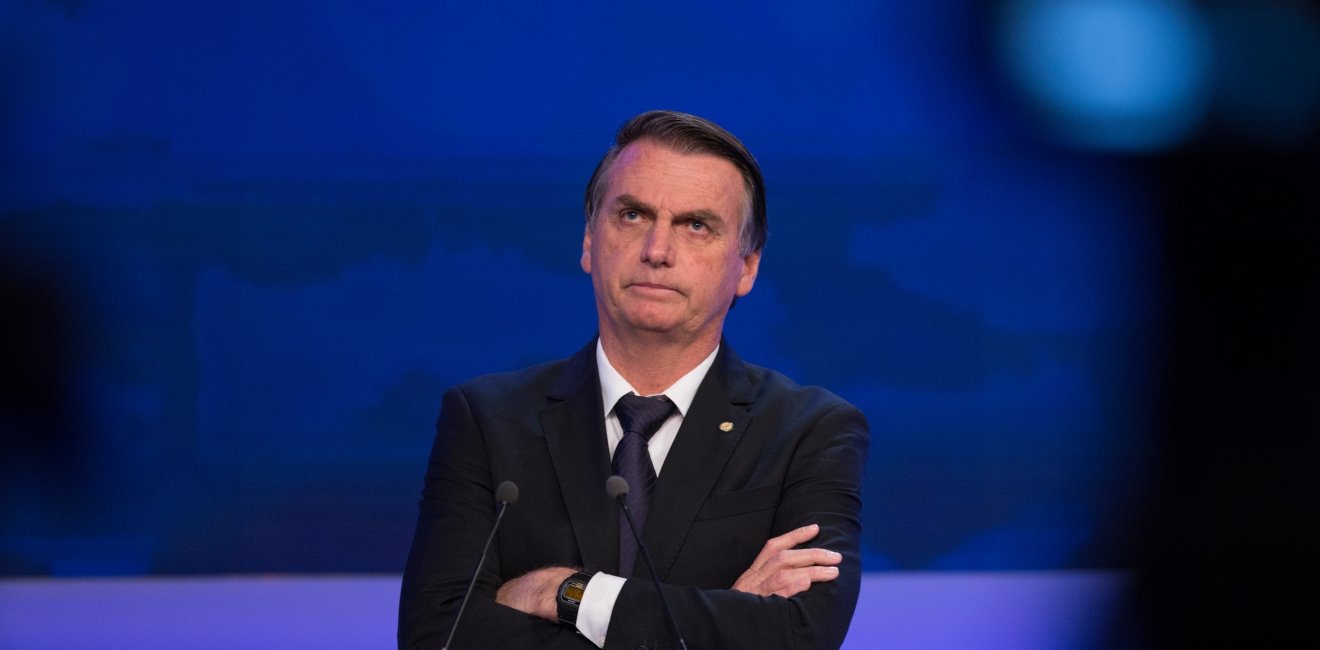
A blog of the Brazil Institute
Editor's note: an earlier version of this article was distributed at the G20 held in Argentina in November 2018, in the G20 Leaders Global Communique.
On October 28, 2018, far-right Congressman Jair Bolsonaro was elected president of Brazil in a stunning rebuke to the leftist Workers’ Party (PT) of former President Lula. A former army captain and congressman with little to show for almost thirty years in the Chamber of Deputies, Bolsonaro was hardly an outsider. Yet he ran an insurgent, anti-establishment campaign, tapping into Brazilians’ anger and frustration with widespread corruption and a public security crisis exacerbated by a three-year economic recession, the longest and deepest in the country’s history. In hindsight, it was not a surprise that Bolsonaro defied decades of political tradition and handily defeated his opponent, Fernando Haddad, a former São Paulo mayor who Lula, serving a prison sentence for corruption since April, anointed as the PT candidate once the courts declared him ineligible for public office. Now, the president-elect must figure out how to govern within the system he ran against, and quickly, given the unfavorable political and economic outlook in Brazil.
To be successful, the untested Bolsonaro will have to control runaway public deficits, especially in the nearly exhausted public pension system, and gain the trust of domestic and foreign investors. He will need to form and steer a government backed by a diverse coalition in Congress with conflicting interests—which will entail abandoning the divisive rhetoric he used to win and unifying public opinion. Whether a liberal economic policy will be welcomed in a society accustomed to government intervention is perhaps the greatest unknown. In Washington and other capitals who applauded the potential change of direction brought by Bolsonaro’s election, officials have expressed doubts about the president-elect’s commitment to reform, including Brazil’s greater integration into the global economy. This concern is fed by the presence in the new government of former senior military officers traditionally associated with statist and nationalist views of government, as well as by Bolsonaro’s proximity to business interests in industry and agriculture historically reliant on protectionism and government support.
Change, however, is in the air. Assuming the economy turns around and begins generating sustainable growth and employment, the new political energy brought by Bolsonaro’s victory will generate momentum for Brazil to reclaim, this time from the right, the international leadership it effectively abandoned during the failed presidency of Dilma Rousseff.
A Drastic Shift in Foreign Policy
Brazilian foreign policy under Bolsonaro will present a very different face to the world than the activist, South-South diplomacy of former President Lula. Bolsonaro’s pick for foreign minister, Ernesto Araújo—a career diplomat and admirer of U.S. President Donald Trump—is a strong critic of what he calls “globalism” and “economic globalization piloted by cultural Marxism,” which he deems “anti-human and anti-Christian.” Araújo publicly campaigned for Bolsonaro, attacking the Worker’s Party as “a terrorist organization” and Lula as “puppet” of Venezuelan President Nicolas Maduro. A climate skeptic described by Bolsonaro as a “brilliant intellectual,” Araújo has vowed to pursue “an active foreign policy” guided by Brazil’s national interests, including a closer relationship with the U.S.. An early demonstration of the rapprochement with Washington is likely to be the blessing of a deal allowing Embraer and Boeing to merge operations through several partnerships for civilian and military airplane co-production and marketing.
Not an expert on trade, Araújo is nevertheless expected to push for reshaping Mercosur from a Customs Union (which it never really was given the number of exceptions introduced by the four Southern Cone members: Brazil, Argentina, Uruguay, and Paraguay) into a Free Trade Area, thus allowing Brazil to pursue its own trade agreements of various formats around the globe.
It is uncertain how the Bolsonaro administration will deal with China, Brazil’s largest trade and investment partner. The president-elect visited Taiwan early in his campaign and criticized China for attempting to “buy” Brazil. Following the election he toned down his rhetoric after a strong warning from Beijing about the potential negative repercussions. The trade war Trump initiated against China and Beijing’s countermeasures have benefited Brazilian exporters of agricultural products and food to the Chinese market. Bolsonaro will need to walk a delicate line to advance his country’s interests while avoiding taking sides.
Bolsonaro has walked back several other promises that would have drawn U.S. praise but could have hurt Brazilian exports. Under pressure from the agricultural lobby, a key political base, he reversed campaign promises to withdraw from the Paris climate accord and move the Brazilian embassy in Israel to Jerusalem, inspired by Trump. But the temptation in Brasília to seek alignment with the U.S. is likely to remain, and could cause turbulence in Brazil’s relations with the European Union and other nations with an unfavorable view of the American leader.
The Urgent Need for Fiscal Reforms
Brazilian foreign policy will have limited influence if the president-elect is unable to resolve economic challenges at home. Without doubt, the most critical task facing the incoming Bolsonaro government will be stabilizing Brazil’s fiscal situation. Expectations are high on this front, due largely to the presence of Chicago-trained economist Paulo Guedes as the finance “super minister” in the new administration. Despite unresolved concerns that Bolsonaro could prove to be a nationalist at heart, limiting the scope for privatizations and other measures, the transition team has pushed ahead in developing a liberal economic agenda, as clearly indicated by the appointment of World Bank executive and former Finance Minister Joaquim Levy to the Brazilian development bank BNDES and the retention of key reformers from the economic team of outgoing President Michel Temer.
Key to this strategy are Guedes’s plans for the privatization of public companies, the drastic reduction of bureaucracy, and the substantive lowering of Brazil’s trade and investment barriers—the highest among middle income economies. But Guedes has stated that pension reform tops the list. Pension spending in 2016 was 8.2 percent of gross domestic product (GDP), making the overhaul of the pension system fundamental to any effort to reduce public debt and spur growth. There is growing recognition among investors that reforms may be less profound and the economic recovery process may take longer than originally hoped, but a failure to pass any pension reform in 2019 would be greeted with serious concern.
Yet pension reform has proven notoriously difficult to pass in Brazil—the last reform (in 2003, under President Lula) did not even touch the minimum retirement age, and the situation has only worsened. Temer’s proposal, currently before Congress, is widely considered an important first step, but insufficient to reverse the fiscal deficit. Congressional leaders have stated that the lame duck session is unlikely to pass pension reform before January 1st, scuttling the incoming president’s public hopes that outgoing legislators would be willing to move forward on the highly unpopular measure, leaving him free to address other economic concerns.
This lack of immediate progress on pension reform underscores a more serious issue: there is no indication that the president-elect’s current team is capable of effectively cajoling and negotiating with Congress. Bolsonaro will undoubtedly discover, as did his predecessors, that Congress can make or break the administration’s economic agenda. He can expect a broad coalition in Congress, but it will likely prove strongest on conservative social issues, public security, and agriculture—and could easily splinter when faced with highly unpopular legislation like pension reform. Moreover, Bolsonaro has already disavowed two of the traditional methods of enforcing coalition discipline in the fractionalized Brazilian system: rewarding coalition parties with cabinet ministries and other patronage jobs, and pork barrel spending in exchange for votes. As a result, the power of the bully-pulpit may prove far more important to Bolsonaro’s economic agenda than in past administrations.
Conclusion
Some of Bolsonaro’s cabinet choices indicate that he may be looking to mitigate some of the critiques against him. The appointment of Levy to the BNDES and other traditional economic choices suggest that the incoming administration recognizes the need to redefine the relationship between the state and the private sector, contributing to the sense of cautious optimism felt by many in the business community. The selection of Federal Judge Sergio Moro, who led the Lava Jato corruption investigations, as justice minister has strengthened confidence that the new government will adhere to the rule of law (despite concerns raised about the politicization of the judicial process).
However, none of these measures will be meaningful if the administration fails the test of leadership and does not advance needed fiscal reforms during the first year of the new administration. Brazilian foreign policy and economic policy will be inextricably linked for the Bolsonaro administration. Resolving Brazil’s fiscal mess will generate international buzz for the new government, spurring further investment and helping to revive Brazil’s role on the global stage. Similarly, perception of Brazil and its foreign policy stance could have a significant impact on trade and investment. In the absence of necessary reforms, the new Brazilian leader’s honeymoon will be short, regardless of his ability to speak directly to the people via social media. There is hope that the exigencies of the moment will mean at least some of these policies are implemented. As Ana Paula Vescovi, the outgoing deputy minister of Finance, wryly explained in a recent presentation, “The good news is that we have run out of money.”
Authors

Senior Director, Albright Stonebridge Group


Brazil Institute
The Brazil Institute—the only country-specific policy institution focused on Brazil in Washington—aims to deepen understanding of Brazil’s complex landscape and strengthen relations between Brazilian and US institutions across all sectors. Read more

Explore More in Brazil Builds
Browse Brazil Builds
They're Still Here: Brazil's unfinished reckoning with military impunity



